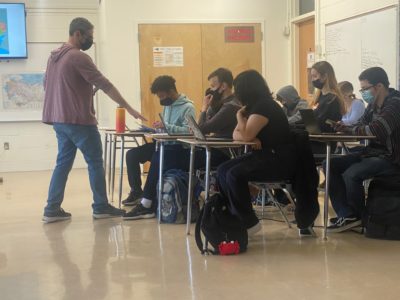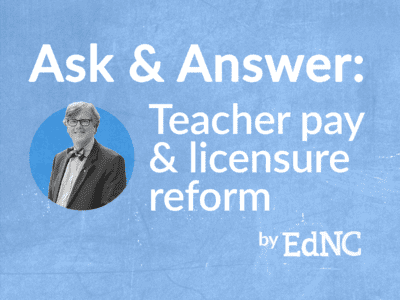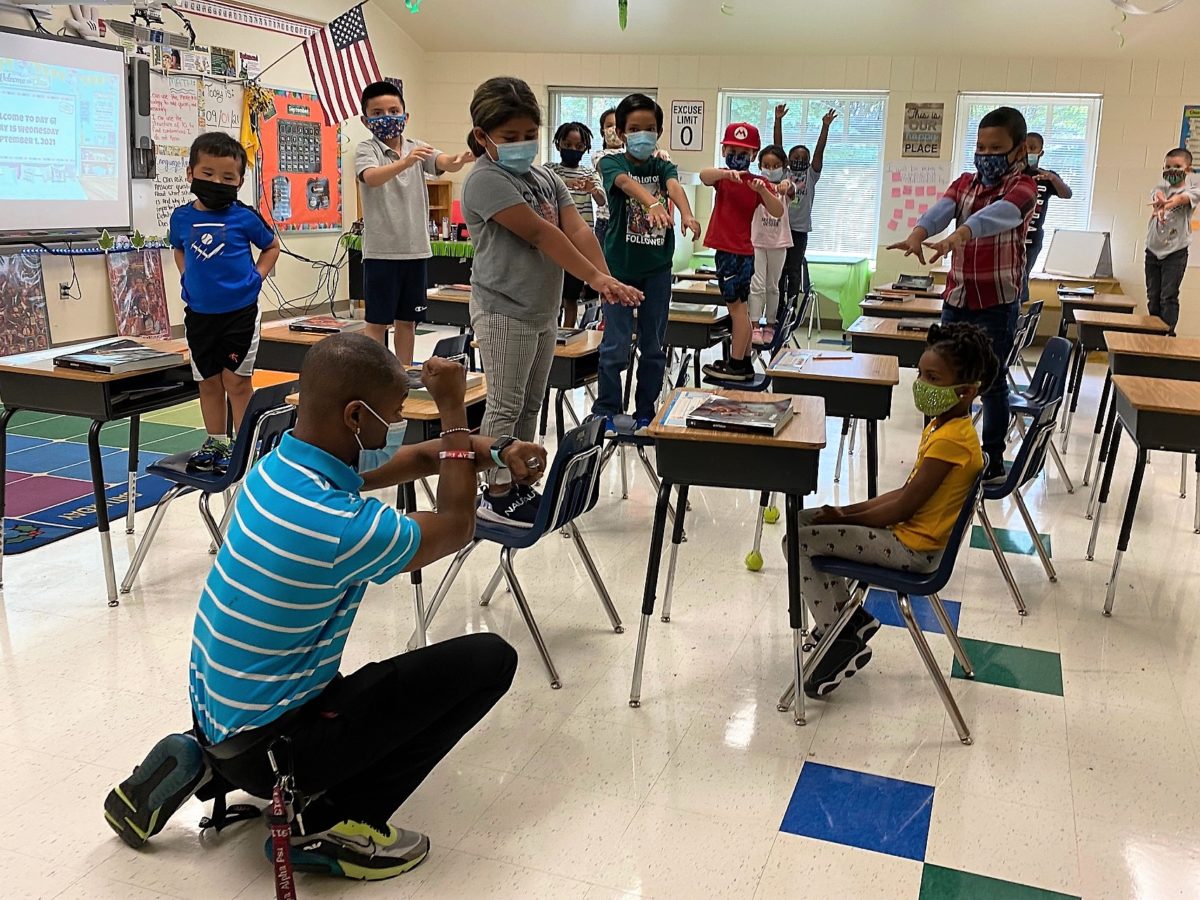

|
|
The Professional Educator Preparation and Standards Commission (PEPSC) voted 9-7 today to send a “Blueprint for Action” on teacher licensure and pay to the State Board of Education for consideration next month.
The Board cannot adopt a new licensure plan without asking for the legislature to make changes to current law, so the recommendations coming from PEPSC reflect that reality. And while the plan will now be in the hands of the Board, PEPSC Chair Van Dempsey said that the commission’s responsibility is not done.
“We will continue to do the work that we have been doing and continue stewarding the document,” he said.
The vote on the plan initially ended in a tie before a couple of members who had been on the virtual meeting earlier rejoined and voted yes.
What’s in the plan?
The proposal would move teacher pay from the current model based on years of experience to a new one that would include different levels of licensure and pay. Under the model, pay would be substantially higher for teachers than it is currently, and would give a range of potential licensure options from apprentice at the bottom to advanced leadership roles at the top.
The new teacher salary schedule is below. Additionally, the two advanced leadership positions — Advanced Teacher Classroom Excellence and Advanced Teacher Adult Leadership — would get the License IV pay plus $5,000 and $10,000, respectively.
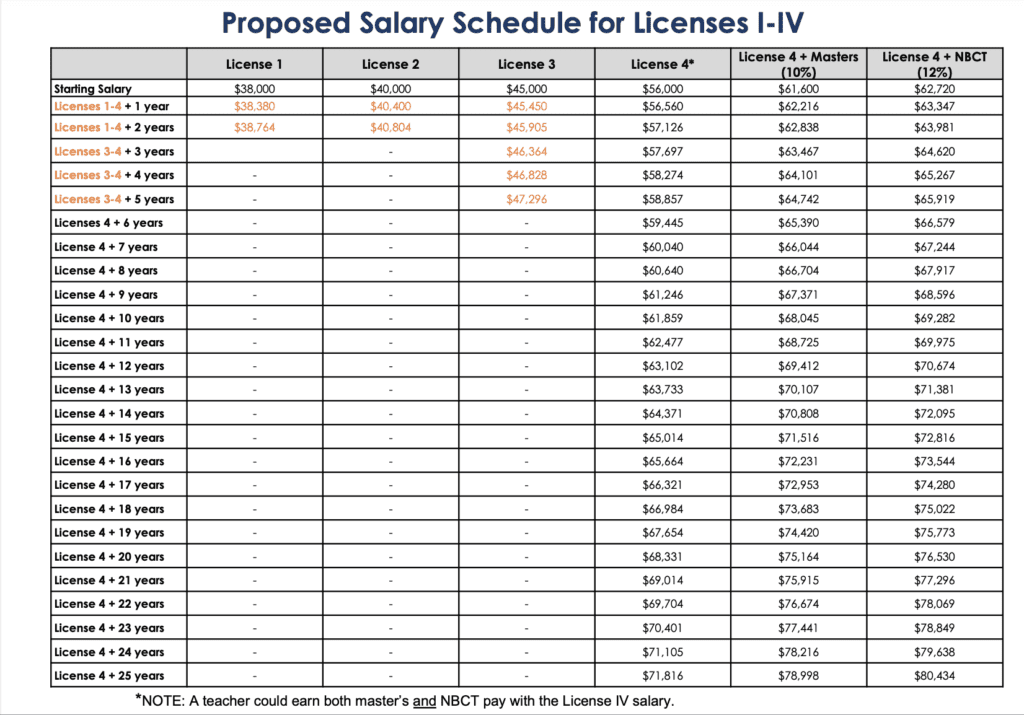

How is the action framework different than the plan?
Though PEPSC has spent the last year and a half fine tuning the proposal, it can’t be implemented until state law changes. Instead, what PEPSC approved today is more of a framework, meaning that specific aspects of the proposal will be developed later on depending on what happens at the Board and the legislature.
With that in mind, Dempsey asked PEPSC members to consider doing three things out of the meeting today:
- Forwarding the action blueprint on the licensure plan to the Board.
- Requesting that the Board begin to determine statutes and policies that would need to change in order to move forward with the plan.
- And asking for direction from the Board on “development of potential implementation” and future recommendations from PEPSC on the licensure plan.
Below is the action framework considered and revised during the meeting.
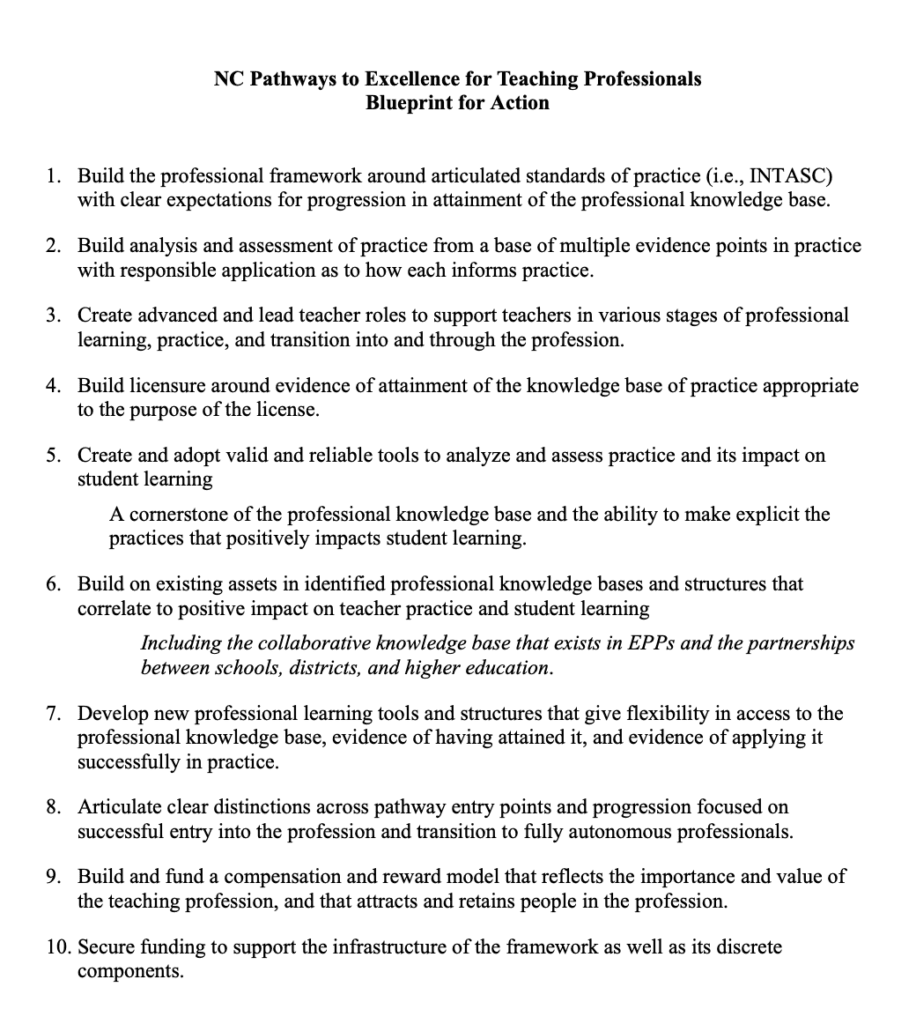

Scott Elliott, superintendent of Watauga County Schools and PEPSC member, asked whether the blueprint was clear enough when it came to the desire of PEPSC for there to be multiple options for teachers to demonstrate effectiveness.
“Does this blueprint adequately communicate that we would consider other tools … of effectiveness beyond EVAAS and tests?” he asked.
Dempsey said that building out measures of effectiveness is work that would ultimately come back to PEPSC, and so the group would be able to ensure options in that area.
Elliott also questioned the use of the word “reward” in point number nine, worrying that it supports the common criticism that the PEPSC plan amounts to merit pay. Dempsey said that word could be deleted.
PEPSC member Marcie Holland, senior director of Human Resources at Wake County Public Schools, said the blueprint does not address the compensation of educators other than teachers. She said that teacher salary schedules have been tied to that of other educators for years.
“Your student services personnel and your administrators and your other salary schedules and your other structures need to be looked at and addressed as well,” she said.
Holland said she wasn’t necessarily advocating that something about this issue be added to the points in the action blueprint, but she said it should be mentioned in some capacity when it comes to presenting to others — such as the Board — the work of PEPSC on this licensure model.
Thomas Tomberlin, senior director of human capital for the state Department of Public Instruction (DPI), said that looking at compensation of other educators and staff is a part of State Superintendent Catherine Truitt’s Operation Polaris plan, and will likely be the next step in reform after the teacher licensure plan.
Vote
A motion to move forward with the three points Dempsey said were up for consideration was made and seconded, but before a vote, Elliott said he wasn’t sure that the blueprint for action was ready. He said he supported the work that PEPSC had done, but that there was more to do.
“We owe it to our teachers to do this and get it right,” he said. “But I just don’t think we’re there yet.”
Dempsey and Vice Chair Aaron Fleming both emphasized that moving the plan forward to the Board didn’t mean this was the end of PEPSC’s work, and that the commission would continue to refine the model and address concerns from educators in the field.
Elliott ultimately voted against the motion, along with six other PEPSC members, and the motion ended in a 7-7 tie. A few PEPSC members had been attending the virtual meeting earlier but weren’t there for the vote, including PEPSC member Sam Houston, who had made the motion.
It looked like PEPSC was going to have to continue discussions for another month before it was discovered that Houston’s connection to the meeting had dropped. After he reconnected, he voted for the proposal. Deputy State Superintendent Michael Maher also rejoined and voted for the motion.
Ann Bullock, PEPSC secretary and dean of the Elon University School of Education, questioned whether the vote process was legitimate considering Houston and Maher weren’t there initially. Board Attorney Allison Schafer said that, at least in Houston’s case, it was legitimate since his connection had dropped. She said she didn’t know why Maher wasn’t there for the vote.
Next steps
The plan will go before the Board in December, and members will likely make a decision on what to do next at that meeting. During this month’s Board planning session and meeting, Schafer said that if the Board wants to move forward with the proposal, it needs to decide what to ask the General Assembly to do.
Any plan would require action by lawmakers. The Board cannot adopt a new licensure plan without changes to the law, Schafer said. She also said that lawmakers can do whatever they want with whatever proposal the Board decides to present.
“The question is what you want to ask the General Assembly to do,” she told the Board earlier this month. “If you want them to implement the whole document, which includes very specific requests for very specific amounts of money, or is it something more general that goes to the General Assembly for a request that is more big ticket items.”
Schafer encouraged the Board to consider the flexibility DPI and the Board might want going forward if the law is changed. She cautioned against asking the General Assembly to “implement too much detail.”
Schafer made the same presentation to PEPSC today that she made to the Board earlier this month. See that presentation here.
See the full presentation on the licensure plan from the meeting here.




